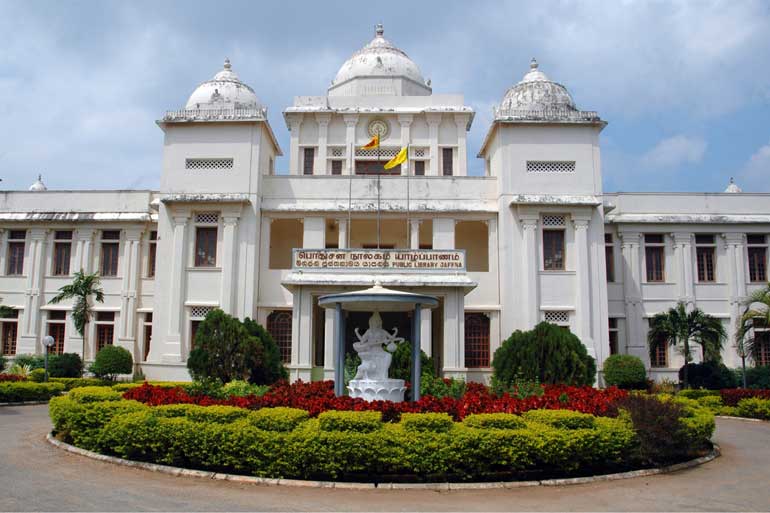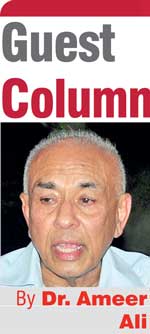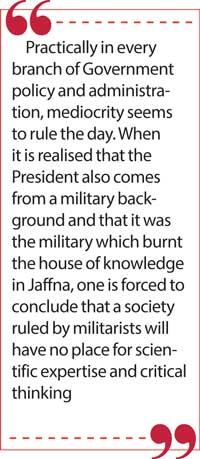Monday Feb 16, 2026
Monday Feb 16, 2026
Thursday, 3 June 2021 00:00 - - {{hitsCtrl.values.hits}}

The burning of Jaffna library was the incendiary war on the Tamil community for its refusal to remain second class citizens in Sri Lanka’s majoritarian democracy. However, there was also an element of envy in this targeted incendiarism
 The first day of June 1981 was one of the darkest days in Sri Lanka’s cultural history. It was on that day that the Sri Lankan Army (SLA), obviously with the knowledge and consent of rulers in Colombo, set ablaze the Jaffna Public Library, which was painstakingly built in 1931 and remained as an icon of the Tamil community’s love for knowledge and education.
The first day of June 1981 was one of the darkest days in Sri Lanka’s cultural history. It was on that day that the Sri Lankan Army (SLA), obviously with the knowledge and consent of rulers in Colombo, set ablaze the Jaffna Public Library, which was painstakingly built in 1931 and remained as an icon of the Tamil community’s love for knowledge and education.
With more than 90,000 volumes of books and rare documents it was an invaluable treasure trove of learning and information. That despicable crime committed by the SLA was, in a sense, the incendiary prelude to the vicious pogrom unleashed on the Tamil community in July 1983.
Burning libraries, books and authors in public are not new to history. In fact, it was Julius Caesar who, quite accidentally set fire to the library in Alexandria during his battle against the Egyptian ruler Ptolemy XIII in 48 BC. His intention was to burn the harbour, without being aware that it was in its surroundings that the library of Alexandria was placed.
Who can forget the Nazi book burnings in 1930s? Even very recently, Islamists in Timbuktu in Mali were all out to burn rare Arabic books and documents collected over centuries, because to the Islamists that knowledge tantamount to heresy (See Joshua Hammer, ‘The Bad-Ass Librarians of Timbuktu, Australia’: Allen & Unwin, 2018); and the Syrian Army bombed and destroyed the library in Daraya on the fringe of Damascus (Mike Thomson, ‘Syria’s Secret Library, Great Britain’: Orion, 2019) in its attempt to starve its people and break their resistance against the Assad regime.
Similarly, the burning of Jaffna library was the incendiary war on the Tamil community for its refusal to remain second class citizens in Sri Lanka’s majoritarian democracy. However, there was also an element of envy in this targeted incendiarism.
From the time of independence, all Sinhala dominated governments in Colombo were determined to break the dominance of this community in public professions and education. Even within the Tamil community, it was the Jaffna Tamils who had a head start in English education during colonial times, and education remained as their leading industry. They were therefore able to enjoy the lion’s share in higher education and public professions.
The Sinhala Only Bill, passed in 1957, and the University Standardisation scheme introduced in 1971 – all in the name of affirmative action – were really intended to beat the Jaffna dominance. Unable to beat them on a level playing field, those two measures were brought in by Sinhala governments to reverse the situation. That reversal has now created a new imbalance, but in favour of the majority community.
Viewed from this angle the burning of the library was meant to hit the nerve centre of Jaffna Tamils chief industry. The attack on a repository that had no way of defending itself was therefore more an act of envy than a strategy of war. It also reflects an uncivilised attitude towards knowledge not only by the attackers and their military commanders but also the politicians in power who approved it. It will remain as one of the darkest chapters in the cultural history of the island. 
That attitude however seems to have resonance today after 40 years when one looks at the aversion the current rulers in the country have towards independent and expert knowledge on various issues bedevilling the country, but which goes against the rulers’ in-house knowledge.
The management of the pandemic is one area where this attitude is amply reflected. The advice from independent experts in epidemiology on how to manage and control the pandemic effectively differs fundamentally from that offered by the trade union of medical officers and Government doctors. The regime ignores expert advice and plays politics with trade unions. How does one rate a Minister of Health, who believes in holy water as panacea for pandemic? How does one rate the efficiency of a Government health administration when it is prepared to allow dubious concoctions as cure for the pandemic and ignore advice of experts? Wasn’t it the same aversion towards expert scientific knowledge that forced cremation of Muslim COVID-dead, which went against that community’s religious rites?
The same attitude is again reflected in the President’s ban on import of chemical fertilisers without consulting any agronomist or scientist. Earlier, he also banned import of palm oil and was forced to back track when manufacturers pointed out the adverse effect it had on industries.
Practically in every branch of Government policy and administration, mediocrity seems to rule the day. When it is realised that the President also comes from a military background and that it was the military which burnt the house of knowledge in Jaffna, one is forced to conclude that a society ruled by militarists will have no place for scientific expertise and critical thinking.
(The writer is attached to the School of Business & Governance, Murdoch University, Western Australia.)